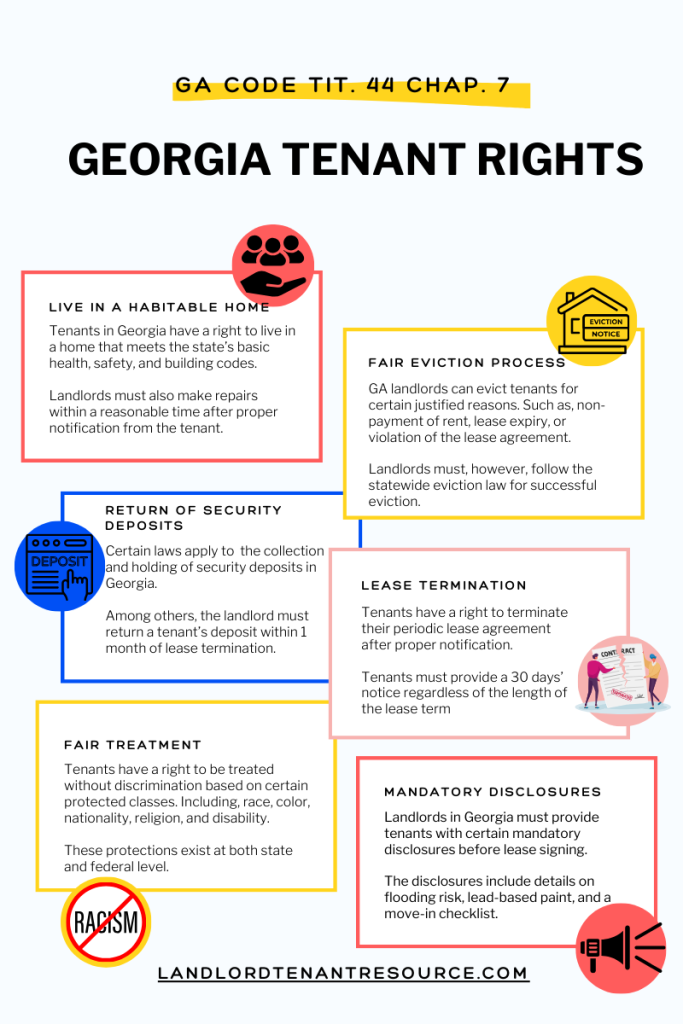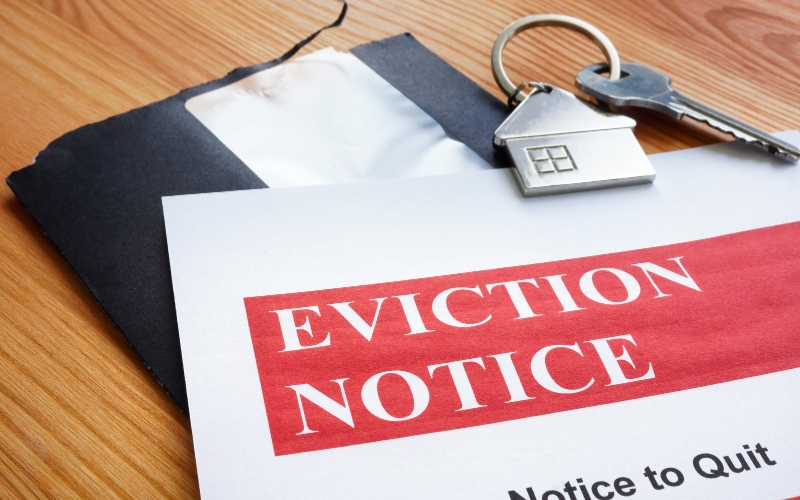Last Updated on May 11, 2024 by Kelvin Nielsen
Under Georgia landlord-tenant law (GA Code Title 44 Chapter 7), landlords can evict tenants for certain reasons. They can, for instance, evict you for not paying rent, violating the lease term, and failing to move after your terms ends.
That said, can a landlord evict you for no reason in Georgia? No! This would be a serious violation of Georgia laws on the part of the landlord.
A GA landlord must have a legitimate reason for tenant eviction. They cannot just wake up one day and decide they no longer like you and try to evict you from your rented premises. They must also go through the state’s eviction process to obtain a court order. This process can usually take up to 3 months from start to finish.
The following are answers to commonly asked questions regarding tenant eviction in Georgia.
When Can a Landlord Evict a Tenant in Georgia?
Your landlord can evict you for certain legitimate reasons. They include the following.
- Failing to pay rent after it becomes due.
- Failing to clear your utility bills or other fees owed to the landlord or utility company.
- Violating a term of the lease. For example, keeping an unauthorized pet, making an unauthorized property change, or engaging in illegal activity at the premises.
- Failing to move out after your lease ends.
What is an Illegal Eviction in Georgia?
In Georgia, an illegal eviction occurs when a landlord tries to evict you outside the provisions of the law. Illegal evictions usually occur in either of three ways.
One, is where the landlord uses “self-help” eviction tactics. These are forceful methods meant to force you out by making your life unbearable. Examples include locking you out, shutting down utilities, removing your belongings, and using verbal or even written threats.
Two, a landlord may try to illegally evict you by using retaliatory methods. This often occurs as a result of the tenant exercising their legal rights. Such rights include the following.
- Reporting the landlord to a local government health agency due to habitability issues.
- Joining or forming a tenants’ union to advocate for your rights.
Another illegal eviction tactic your landlord may use is trying to evict you due to your protected class. The Fair Housing Act (FHA), guarantees tenants protections based on 7 protected classes. They are: race, color, religion, sex, disability, nationality, and familial status.
An example would be the landlord trying to evict you (a black tenant) for unpaid rent but doesn’t do so for a white tenant in a similar situation.
How Much Notice Must a Tenant Be Given Before Eviction in Georgia?
As already mentioned, a landlord cannot just wake up one day and decide they no longer want you around. Georgia law is very specific on what they must do to evict a tenant from their rented premises.
Now, the tenant eviction process in Georgia follows certain steps. If the landlord fails to follow them, you may be able to use that as a defense against your eviction in court. And this would be regardless of whether you’ve violated the lease or not.
The following table summarizes the notice requirements for eviction in Georgia.
| Ground for Eviction | Notice Period |
| Failing to pay rent when it falls due | 3 Days to Pay the Balance Due or Move Out. |
| Failing to move out after the lease expires | 60 Days’ Notice to Move Out |
| Violating a term of the lease, such as failing to maintain the unit in a clean and habitable standard. | No Statute. However, most landlords give tenants 3 days to fix the violation. |
| Engaging in illegal activity | Immediate eviction. |
How long does an eviction stay on your record in Georgia?
In Georgia, an eviction can stay in the public records for seven years. The records may include court documents related to the eviction lawsuit.
In addition, an eviction can also have an impact on your credit reports. This is especially the case if the eviction was due to your inability to pay rent or clear your utility bills. If the landlord sends these to collections, the collection account can stay on your credit report for up to seven years as well.
Can a landlord evict you without going to court in GA?
No; the only way the landlord can evict a tenant from their rental premises is by obtaining a court order. As already mentioned, the landlord cannot engage in illegal eviction methods such as locking you out or removing your belongings.
The following is a basic overview of what the Georgia tenant eviction process is like.
- The landlord serves you an appropriate eviction notice. For example, if the eviction is due to non-payment of rent, the landlord must first terminate the tenancy by providing you with a 3 Day Notice to Pay or Quit. This will give you only 3 days to either pay the rent balance or risk an eviction.
- The landlord files a lawsuit with the court. In Georgia, landlords must file a dispossessory affidavit or warrant with the appropriate court.
- The tenant gets an opportunity to respond to the landlord’s allegations.
- Both parties attend the court hearing and await judgment.
- The court issues a court order for the tenant eviction.
In Georgia, a court order is referred to as a writ of possession. It is the tenant’s last notice to leave. If the tenant fails to leave, the sheriff will be left with no other choice but to carry out a forceful eviction.
What are my rights as a tenant in Georgia?
The following is a rundown of the rights tenants in Georgia have once they establish a lease with a landlord.

Conclusion
So, can a landlord evict a tenant for no reason in Georgia? As can be seen, this would be illegal! You can go to court and sue the landlord for wrongful eviction. The landlord may have to pay you the equivalent of up to 3X the monthly rent. They may also face jail time, especially if there were threats involved as well.
Disclosure: The content herein isn’t a substitute for advice from a professional attorney. It’s only meant to serve educational purposes. If you have a specific question, kindly seek expert attorney services.
Sources: GA Code Title 44 Chapter 7, Georgia Landlord-Tenant Handbook, Wrongful Eviction

I am a real estate attorney with over 11 years of experience in tenant eviction cases. My mission here at LTRC is to help answer your commonly asked questions on everything regarding real estate laws, especially on eviction matters.
I’m a member of the following professional organizations: Attorneys’ Real Estate Councils of Florida (ARECs), Florida Bar Real Property, Probate & Trust Law Section, American College of Real Estate Lawyers (ACREL), and the Florida Association of Community Managers (FACM).







